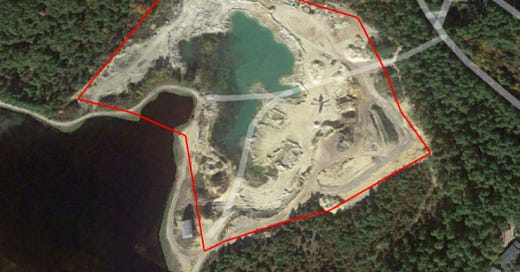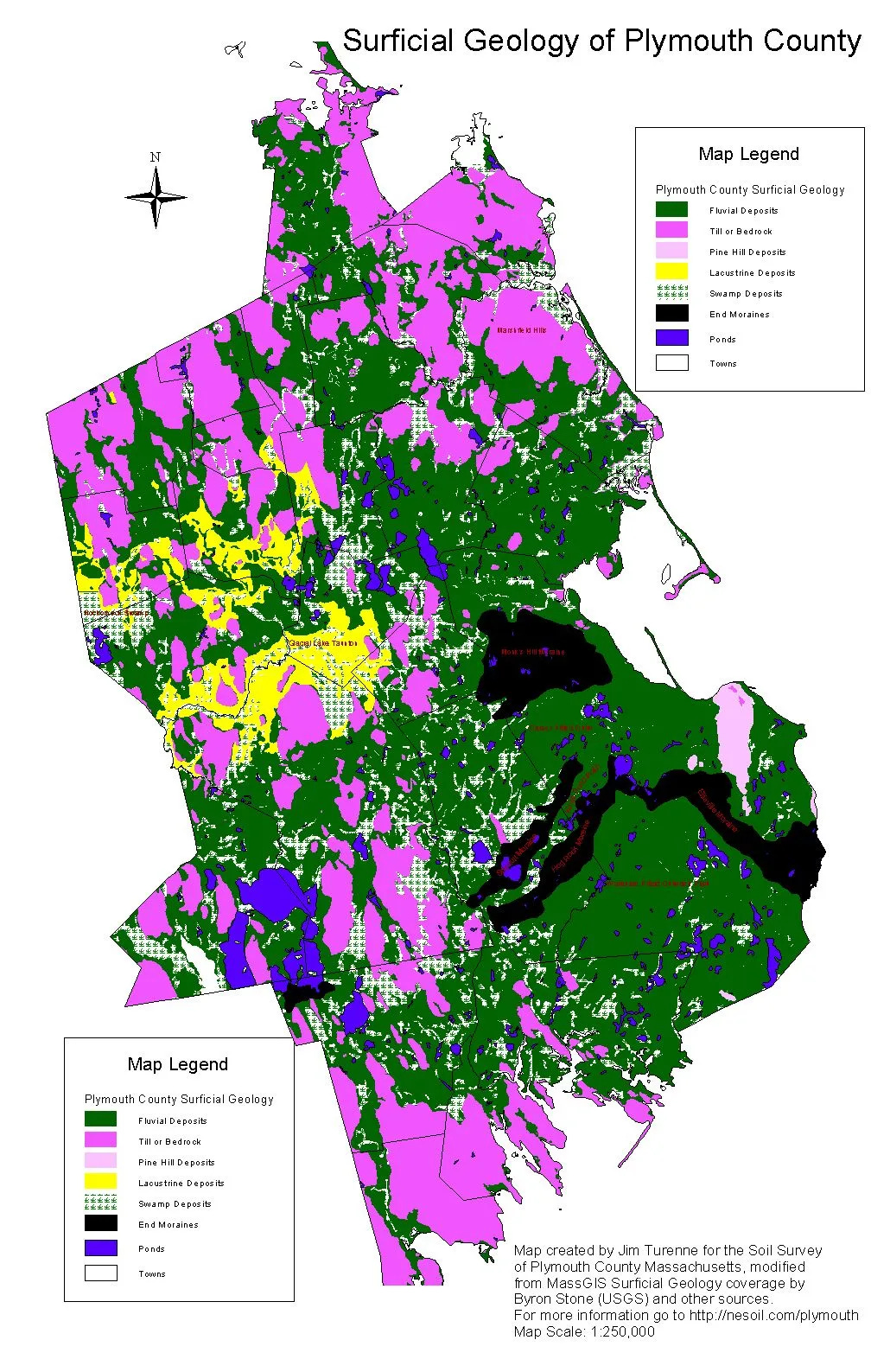Local Citizens Challenge Sand Mining Interests
Concerned Residents of Plymouth and Carver Point to Threat to Aquifer, Drinking Water; Argue several local mining operations are illegal.
(CARVER AND PLYMOUTH) — Concerned citizens intend to challenge the permits for local sand and gravel mines at meetings of the Carver Earth Removal Committee and of the Plymouth Zoning Board of Appeals on Wednesday, December 7th, at 7 p.m.
A rally will be held at Carver Town Hall, starting at 6 p.m.
The opponents of deforestation and sand-mining in both Towns — a diverse array of citizens, Native people, environmentalists, and others who have come together in the Community Land and Water Coalition (savethepinebarrens.org) — point to the grave threat such activities pose to the Plymouth-Carver Sole Source Aquifer and drinking water supplies, and argue that the mining operations are illegal.
( The Maki-Lopes Mine from above in Carver; photo credit — The Community Land and Water Coalition. )
The aquifer — stretching across Plymouth, Carver, Plympton, Kingston, Wareham, and Bourne — serves as the main source of drinking water for approximately 120,000 people across the southern half of Plymouth County. The hundreds of ecologically and economically valuable ponds — really glacial lakes — that dot the southern half of the region are expressions of this aquifer, as are the surface waters of wetlands, such as Atlantic white cedar or red maple swamps.
( The Plymouth-Carver Sole Source Aquifer; photo credit — United States Environmental Protection Agency. )
Over the course of the 19th century and 20th century, those wetlands were converted, in large part by economically and socially powerful local family networks, into cranberry bogs.1 For the majority of that time, cranberry prices on world markets remained high. However, by the late 20th century and the early 21st century, huge amounts of new cranberry production in places like Wisconsin, Quebec, and beyond, caused the prices of cranberries on global markets to plummet.
( The Federal Reserve of St. Louis’s index of cranberry prices over the past three decades, using US BLS data; photo credit — Federal Reserve Bank of St. Louis. )
It is no accident that this period of a general fall in cranberry prices coincided with a shift by cranberry growers to other sources of income, including real estate development, logging (lumber prices are also increasing), sand and gravel mining, and solar power, especially certain associated subsidies.2
Sand, in particular, during this period dramatically increased in price:
( The St. Louis Federal Reserve’s index of the price of sand over the last four decades, using BLS statistics; photo credit — The Federal Reserve Bank of St. Louis. )
Because of the surficial geology of Plymouth County and the influence of the glacier, as well as the need for sand in cranberry agriculture, cranberry growers almost by definition will sit atop vast supplies of extremely valuable sand and gravel.
( Surficial Geology of Plymouth County; photo credit — Jim Turenne, Soil Survey of Plymouth County, Massachusetts. Large amounts of sand and gravel are found in glacial till, morainal deposits, fluvial deposits, and Pine Hill deposits. )
This brings us to the present. With sand far more valuable than cranberries, large cranberry growers, who have for over a century constituted a local economic aristocracy, are resorting essentially to a series of legal ruses: claiming the sand mining is incidental to cranberry agriculture, but frequently never actually constructing the bogs they claim to be building; or removing far more sand than the maximum amount required by cranberry agriculture, according to their own calculations.
The permits themselves are frequently questionable, often expired or even simply ignored — at the Frogfoot mine operated by A.D. Makepeace on the Plymouth-Wareham line, for instance, there were 32 missed quarterly inspections of the project by the Plymouth Building Inspector’s Office. These inspections were a condition of the permit, and were simply ignored not only by the industry in question, but also by the Town regulatory authorities.
The Maki-Lopes Mine and the Carver Earth Removal Committee
In large part, the fact that local cranberry, sand mining, trucking, and other extractive economic interests frequently dominate the politics, economic, and social life of the Town of southeastern Massachusetts plays a critical role in this crisis. The list of current and former local officials with ties to the cranberry, sand and gravel, and trucking industries is extensive.
The Chair of the Carver Earth Removal Committee, Robert Ieronimo, owns and operates New England Excavation, and [CORRECTION: Mr. Ieronomo worked as an independent contractor for A.D. Makepeace; he was not, as was originally reported, a long-time employee of Makepeace. The Plymouth County Observer regrets and apologizes for the error] the cranberry growers and the largest private landowners in the region, for whom he dug and hauled sand and gravel. Mr. Ieronimo is also the owner of cranberry bogs.
Another member of the same Committee, John Shurtleff, Jr., of Triple J Trucking, is alleged by Save The Pine Barrens to have hauled sand and gravel for John P. Garretson III, owner and President of Slocum-Gibbs Cranberry, operator of unpermitted sand mines, and the former long-time chair of the Earth Removal Committee.
A third member of the same Committee, John Mason, was recently appointed by the Carver Select Board; Mr. Mason, according to the Community Land and Water Coalition, works for both Slocum-Gibbs Cranberry and A.D. Makepeace.
The case before the Carver Earth Removal Committee concerns an illegal sand mine off Meadow Street in Carver. On Dec. 5th, the Community Land and Water Coalition notified Bette Maki, the landowner, and Gilbert Lopes, Jr., who operates The Lopes Companies of Taunton, the contractor which has been engaged in the illegal mining and hauling activities, of its intent to sue them to force a stop to their unpermitted sand mining and hauling.
( The Maki-Lopes Mine in Carver; photo credit — The Community Land and Water Coalition.)
Meanwhile, amid ceaseless mining activity and anecdotal reports of Carver residents’ private wells actually running dry in the Great Meadow area of South Carver, Dan Ferrini and Mary Dormer, of Carver Concerned Citizens, requested that the item be added to tonight’s Select Board agenda. The request was denied by Select Board Chair Mark Townsend, on the grounds that it had not been made at least five days prior to the meeting.
Plymouth ZBA: Frogfoot Mine, Colony Place Developments and the Plymouth Water Crisis
Plymouth faces similar issues at its Wednesday Zoning Board of Appeals hearing. One of the matters that will be discussed is the aforementioned Frogfoot Mine, operated by A.D. Makepeace on the Plymouth-Wareham line.
The permit for the operation expired, and only 11% of the promised bogs — the very bogs upon which the agricultural permits which allow these massive strip mines are allowed — have been built. There are also serious questions about whether Makepeace ever actually set aside the land for conservation that it promised it would when the permit was originally issued in 2014.
It was revealed at an April 20th, 2022, ZBA Meeting that Plymouth Building Inspector Nick Mayo did not think it necessary to engage in the quarterly inspections required by the (expired) permit, arguing that such inspections were “discretionary.”
“The Building Commissioner’s claim that permit compliance is ‘discretionary’ is like saying people driving in Plymouth don’t have to obey the speed limit because it is just a “recommendation” said Attorney Meg Sheehan, of Save the Pine Barrens. “On top of that, Makepeace is operating without a permit. That’s like saying it’s OK to drive without a permit in Plymouth.”
The Board will also discuss the proposal for a massive, 348-unit development at Colony Place, near the Kingston line.
According to three reports issued in recent years for the Town of Plymouth by the Quincy engineering firm Environmental Partners, the scale and pace of development in West Plymouth in particular means that the Town and its neighbors face a serious water crisis. In 2020, for instance, Environmental Partners told the Town of Plymouth “we suggest the Town proceed cautiously with respect to proposed developments, such as The Walk at Colony Place, to help maintain water system reliability.”
Whether or not the Town proceeds with caution will in part depend upon the results of these upcoming meetings.
The Boards both meet at 7 pm, on Weds., Dec. 7th, at Carver Town Hall and Plymouth Town Hall, respectively.
The cranberry growers essentially operated as owners of extremely large agricultural holding and operations, staffed by an immiserated and much abused workforce; these latter attempted to organize unions and even went on strike in the early 1930s. The cranberry owners, who also controlled local law enforcement authorities, or their agents, are alleged to have shot strikers. The strikes were ultimately broken, and the cranberry oligarchy’s rule remained intact.
These “clean energy” subsidies are a classic example of what economists call a perverse incentive — intending to reduce the amount of carbon in the atmosphere by encouraging a transition to non fossil fuel sources of energy, the subsidies, in a pattern familiar to any student of American capitalism, are essentially “gamed” by powerful economic actors, such that they realize maximum profit while also collective state monies to destroy globally rare carbon sinks.










Unenlightened self interest is driving this train. It is very difficult to enlighten the public before such time that it is too late to fix it. Keep the pressure on; some of these guys get elected to boards because they have the right expertise and experience but then, some end up using the position to promote their own economic interests without concern for the general good.
Thank you Ben, for bringing these important issues to light for the rest of us!